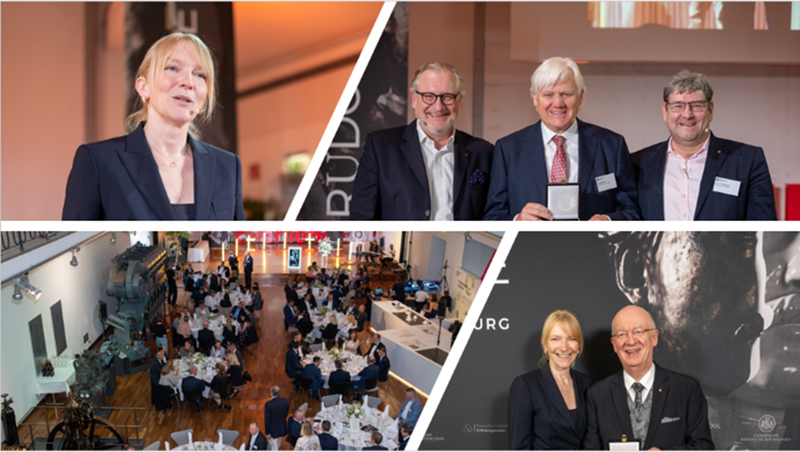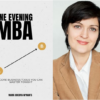Honouring the Pioneers of Innovation: Reflections on the 2025 Rudolf Diesel Medal Ceremony
The 2025 Rudolf Diesel Medal ceremony, held on July 10 at the historic MAN Museum in Augsburg, once again brought together a remarkable community of visionaries, inventors, entrepreneurs, and innovation advocates. As Germany’s oldest innovation award—established in 1953—the Diesel Medal represents more than just a distinction. It is a living tradition that celebrates the lifeblood of economic and technological progress: entrepreneurial inventiveness. In 2025, amid global economic uncertainty, accelerated digital transformation, and pressing sustainability demands, this recognition has never been more relevant.
A Legacy of Entrepreneurial Achievement
Named after Rudolf Diesel, the inventor of the compression-ignition engine, the medal honours lifetime achievements in innovation that have led to successful commercialization. It is not awarded for isolated research or scientific theory, but for applied invention that builds real-world value through intellectual property, product development, and entrepreneurial foresight. This focus on impact distinguishes the Diesel Medal from many other scientific or academic awards.
Over the decades, the list of laureates has grown into a hall of fame for German and European innovation. Previous honourees include iconic figures like Wernher von Braun (rocket technology), Artur Fischer (inventor of the Fischer wall plug), and Claus Hipp (organic baby food). More recent recipients such as Dietmar Hopp (SAP), August-Wilhelm Scheer and Susanne Klatten (sustainability entrepreneurship) exemplify how innovation and entrepreneurship remain tightly intertwined in the 21st century.
The Diesel Medal doesn’t just acknowledge a single invention—it celebrates the courage to bring a vision into the marketplace, navigating risk, competition, and complexity. In doing so, it highlights the role of intellectual property as a central enabler of sustainable success.
Why the Diesel Medal Matters More Than Ever
Today’s economy is increasingly intangible. In a knowledge-driven landscape, competitive advantage lies not in raw materials or labour, but in ideas, expertise, algorithms, brands, and ecosystems. The Rudolf Diesel Medal addresses this shift directly by recognizing the individuals and institutions that protect, scale, and convert ideas into sustainable growth.
At the same time, innovation ecosystems face growing challenges: global supply chains are under pressure, digital platforms are creating new monopolies, and sustainability is no longer optional—it is the core of modern value creation. In this environment, innovation must not only be faster, but smarter and more responsible.
The Diesel Medal plays a unique role by honouring those who embody this evolution. It is a platform for showcasing best practices in IP strategy, technology transfer, and purpose-driven entrepreneurship.
The 2025 Laureates: Leading with Purpose and Impact
This year, the Diesel Medal was awarded in four categories. Each winner demonstrated not only technical brilliance but also the capacity to shape society and industry.
- Prof. Dr. Wolfgang Wahlster
Awarded in the category Best Innovation Support, Professor Wahlster is one of the pioneers of artificial intelligence in Germany. As a founding director of the German Research Center for Artificial Intelligence (DFKI) and a co-creator of the “Industrie 4.0” concept, he shaped not only technical development but also innovation policy. His impact spans from natural language processing to strategic frameworks that guide industrial digitization. He embodies the spirit of the Diesel Medal: connecting visionary thinking with applied implementation. - Prof. Dr. Miriam Meckel
In the category Best Media Communication, Professor Meckel received the award for her outstanding contribution to the public understanding of technology. As co-founder of the ada Learning platform and former editor-in-chief of WirtschaftsWoche, she has consistently translated complex developments in AI, digital transformation, and innovation into accessible and compelling narratives. Her work empowers executives and citizens alike to engage with the future, not fear it. - Fabian Wildfang
The Most Sustainable Innovation award went to Fabian Wildfang, CTO of Neoperl GmbH. His work centers on environmentally efficient water flow solutions, such as the WATERTRAIN® and SOFTPEX technologies. These innovations drastically reduce water consumption in households and industries without sacrificing comfort or performance. Wildfang shows how engineering can align with ecological responsibility, and how sustainability can become a core innovation driver—not a constraint. - Hans Beckhoff
In the category Most Successful Innovation, Hans Beckhoff, founder and managing director of Beckhoff Automation, was honoured. Under his leadership, the company has become a global leader in industrial control technology, achieving revenues of €1.17 billion in 2024. Beckhoff’s platform architecture and commitment to modular automation have set industry standards. His company exemplifies how deep technological expertise, IP protection, and business agility can reinforce one another.
The Role of Intellectual Property: Enabling Innovation to Scale
One of the key messages of the 2025 Diesel Medal ceremony was the centrality of intellectual property in innovation. Patents, trademarks, and trade secrets are not bureaucratic accessories—they are strategic tools that secure investment, protect know-how, and enable licensing and partnerships. They transform creativity into defensible competitive advantage.
This year, the presence of leading patent attorneys underscored this reality. Dr. Diana Taubert, a distinguished patent attorney, delivered a keynote laudation that highlighted the legal and strategic dimensions of the laureates’ achievements. Her speech reminded the audience that innovation without protection is vulnerable—and that the quality of an invention’s impact often depends on the quality of its IP strategy.
Also in attendance were patent attorney Christian Heubeck and Alexander Müller, representing the renowned IP law firm Alexander Müller. Their presence emphasized the growing recognition that innovation ecosystems depend on the expertise of IP professionals who can guide inventors and companies from ideation to market leadership.
These contributions reflect a deeper truth: behind every great inventor is often a great IP strategy—and behind every global tech success, an ecosystem of legal, technical, and entrepreneurial support.
The Ceremony: A Moment of Reflection and Connection
Held in the atmospheric setting of the MAN Museum, surrounded by symbols of Germany’s industrial heritage, the 2025 Diesel Medal ceremony was both a celebration and a conversation. Around 100 guests from industry, academia, law, and media gathered to honour the awardees and to reaffirm the mission of the German Institute of Inventions (D.I.E.), the organizing institution.
The Diesel Medal is evolving—not only as a retrospective honour but as a forward-looking statement. It is an invitation to society to recognize those who take risks, build bridges between science and business, and use intellectual property to secure our shared future.
The speeches by the laureates offered insights into their personal journeys: from early prototypes and setbacks to market breakthroughs. What united them all was a shared ethos of perseverance, purpose, and curiosity.
A Platform for Future Innovators
The Diesel Medal also serves as an inspiration for the next generation. As innovation becomes increasingly interdisciplinary, the boundaries between engineering, data science, design, and law blur. Entrepreneurs today need not only a great product but a platform strategy, a stakeholder network, and a deep understanding of regulatory and IP frameworks.
By showcasing exemplary innovators across domains—from automation and AI to sustainability and media—the Diesel Medal helps emerging inventors understand what it really takes to bring an idea to life in a globalized, complex world.
Looking Ahead
The 2025 ceremony reaffirmed a fundamental truth: innovation is not a solitary act of genius. It is a social process—built on partnerships, guided by values, and sustained through institutions. The Diesel Medal is one such institution. It holds up a mirror to what society values in innovation and helps steer attention toward those who shape our future.
In an age of hype, the Diesel Medal is about substance. In a time of uncertainty, it is about resilience. And in a world of fleeting trends, it honors enduring impact.
As the spokesperson for the Board of the Rudolf Diesel Medal and chairman of the German Institute of Inventions, I am proud of what this award represents. It is not only a celebration of the past, but a call to action for all those working to shape the technologies and enterprises of tomorrow.



